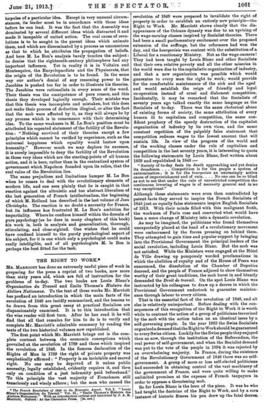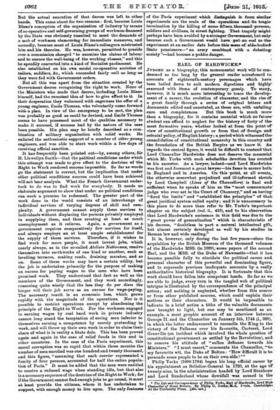THE RIGHT TO WORK.• Ma. MeurtioTT has done an extremely
useful piece of work in preparing for the press a reprint of two books, now more than sixty years old, which are full of instruction for the problems of to-day. The two books are Louis Blanc's Organisation the Travail and Emile Thomas's Histoire des Ateliers Nationaux. To the text of these works Mr. Marriott has prefixed an introduction in which the main facts of the revolution of 1848 are lucidly summarized, and the lessons to be drawn from this great essay at practical Socialism are dispassionately examined. It is to this introduction that the wise reader will first turn. After he has read it he will And that all that remains for him to do is to verify and complete Mr. Marriott's admirable summary by reading the texts of the two historical volumes now republished.
The first point which Mr. Marriott brings out is the com- plete contrast 'between the economic conceptions which prevailed at the revolution of 1789 and those which inspired the revolution of 1848. In the famous declaration of the Rights of Man in 1789 the right of private property was emphatically affirmed : " Property is an inviolable and sacred right. No one may be deprived of it unless public necessity, legally established, evidently requires it, and then only on condition of a just indemnity paid beforehand." To this principle the vast majority of Frenchmen still tenaciously and wisely adhere ; but the men who caused the
' The French Revolution of 1848 in its ECon0mie Aspect. Vol. I. " Louis tBlanc's Organisation du Travail." Vol, IL, " Emile Thomas's Histoire des Ateliers Nationaux." With an introduction critical and historical by J. A. R. Marriott. Oxford : etthe Clarendon Press. [5s. net.]
revolution of 1848 were prepared to invalidate the right of property in order to establish' an entirely new principle—the Right to Work. Mr. Marriott shows clearly that the dis- appearance of the Orleans dynasty was due to an uprising of the wage-earning classes inspired by Socialist theories. There had been a small parliamentary excitement over the proposed extension of the suffrage, but the reformers had won the day, and the bourgeoisie was content with the substitution of a Liberal for a reactionary Ministry. Not so the wage-earners! They had been taught by Louis Blanc and other Socialists that their own relative poverty and all the other miseries in the world were due to the capitalistic organization of industry, and that a new organization was possible which would guarantee to every man the right to work; would provide for the comfortable maintenance of the sick and the aged and would establish the reign of friendly and loyal co-operation instead of cruel and dishonest competition. Incidentally, it may be remarked that the Socialists of seventy years ago talked exactly the same language as the Socialists of to-day. There was the same rhetorical abuse of existing forms of society, the same attribution of every human ill to capitalism and competition, the same con- fident prophecy of the speedy destruction of the capitalist organization of industry by its own vices, and the same constant repetition of the palpably false statement that competition reduces wages to the lowest amount that will sustain life. In view of the progress of the world and of the working classes under the rule of capitalism and competition in the last seventy years, it is interesting to quote the following statements by Louis Blanc, first written about 1839 and republished in 1848 :—
" Society of to-day feels its death approaching and yet denies its decadence. . . . Competition is for the people a system of extermination ; it is for the bourgeoisie an unceasingly active cause of impoverishment and of ruin. . . . No one can be so blind as not to see that under the rule of unrestricted competition the continuous lowering of wages is of necessity general and in no way exceptional."
Although these statements were even then contradicted by patent facts they served to inspire the French Socialists of 1848 just as equally false statements inspire English Socialists of 1913. With their minds filled with this malignant froth, the workmen of Paris rose and converted what would have been a mere change of Ministry into a dynastic revolution.
As may be imagined, the politicians who found themselves unexpectedly placed at the head of a revolutionary movement were embarrassed by the forces pressing on behind them. They attempted to gain time and popular support by bringing into the Provisional Government the principal leaders of the social revolution, including Louis Blanc. But the mob was not satisfied. While the Ministers were engaged at the Hotel de Ville drawing up pompously worded proclamations in which the abolition of royalty and of the House of Peers was announced, the dissolution of the Chamber of Deputies decreed, and the people of France adjured to show themselves worthy of their great traditions, the mob burst in and bluntly demanded the Droit de travail. On the spot Louis Blanc was instructed by his colleagues to draw up a decree in which the Provisional Government undertook to guarantee mainten- ance through labour to every citizen.
That is the essential fact of the revolution of 1848, and all else is relatively unimportant. Before dealing with the con- sequences of this recognition of the Right to Work it is worth while to contrast the action of a group of politicians terrorized by the mob with the action taken on an identical issue by a self-governing people. In the year 1893 the Swiss Socialists organized a demand that the Right to Work should be guaranteed to every Swiss citizen. Luckily for the Swiss people they enjoyed then as now, through the institution of the Referendum, the real power of self-government, and when the Socialist demand was put to the vote of the people in 1894 it was rejected by an overwhelming majority. In France, during the existence of the Revolutionary Government of 1848 there was no self- government. A group of more or less self-elected politicians had succeeded in obtaining control of the vast machinery of the government of France, and were quite willing to make unlimited promises at the expense of French taxpayers in order to appease a threatening mob.
So far Louis Blanc is the hero of the piece. It was he who had taught the doctrine of the Right to Work, and by a rare instance of historic fitness his pen drew up the fatal decree.
But the actual execution of that decree was left to other hands. This came about for two reasons : first, because Louis Blano's conception of the organization of industry by means of.co-operative and self-governing groups of workmen financed by the State was obviously unsuited to meet the demands of a mob of workmen clamouring for immediate measures, and secondly, because most of Louis Blanc's colleagues mistrusted him and his theories. He was, however, permitted to preside over a commission charged " to examine the claims of labour and to ensure the well-being of the working classes," and this he speedily converted into a kind of Socialist parliament. He also established on his own model co-operative societies of tailors, saddlers, &c., which succeeded fairly well as long as they were fed with Government orders.
But all this was apart from the situation created by- the Government decree recognizing the right to work. None of the 'Ministers who made that decree, indluding Louis Blanc himself, had the remotest idea of how to give effect to it. Ise their desperation they welcomed with eagerness the offer of -a young engineer, Emile Thomas, who voluntarily 'came forward with plen. In view of the emergency to be met, the plan was probably as good as could'be devised, and Emile Thomas seems to have _possessed most of the qualities necessary to make it succeed, if success had by the nature of the ease been possible. His . plan may be briefly desetibed as a com- bination of military organization with relief works. He enlisted the enthusiastic support of a number of other young engineers, and was able to start work within a few •days of receiving official sanction.
It has frequently been pointed out—by, among others, Sir H. Llewellyn Smith—that the political conditions under which this-attempt was made to give effect to the doctrine of tlie Right to Work rendered success impossible. So far as words go the statement is correct, but the implication that under other political conditions success could have been achieved will not bear analysis. What the French Government under- took to do was to find work for everybody. It needs no elaborate argument to show that tinder no political conditions can such a promise be redeemed. The greater part of the work done in the world consists of an interchange of individual services of varying degrees of skill and eem- plexity. A government cannot supply these services to individuals without displacing the persons privately employed in supplying them, and thus creating at least as mach unemployment as it relieves. Again, a government as a government requires comparatively few services for itself, and 'always employs an at least ample establishment for the supply of those services. Therefore, if it wishes to find work for more people, it must invent jobs, -which nearly always, as in the so-called Ateliers Nationsuw, resolve themselves into earthworks of one kind or another, such as levelling terraces, making roads, draining marshes, and so on. Some of these works may have a certain -utility, but the job is undertaken primarily for the purpose of making an excuse for paying wages to the men who have -been promised work. They understand that fact as well as the members of the Government, and they work accordingly, reasoning quite wisely that the less they do per diem tire longer will their job serve as an excuse for wageepaying. The necessary result is an economic loss, which grows rapidly with the magnitude of the operations. Nor is it possible to restrict operations except by abandoning the principle of the Right to Work. For the workmen engaged in earning wages by real hard work in private industry cannot long stand the temptation of seeing men inferior to themselves earning a competence by merely pretending to work, and will throw up their own work in order to claim their share of what is in reality a State dole. This has been proved again and again in the case of relief funds in this and in other countries. In the caee of the Paris experiment, this moral corruption was so rapid that within three months the number of men enrolled was one hundred and twenty thousand, and this figure, "assuming that each ouvrier represented a family of four persons, accounted for half the entire popula- tion of Paris." It must be added that the men were-entitled to receive a reduced wage when standing idle, but that also is a necessary sequence of the doctrine of the Right to Work; •for if the Government...cannot find enough jobs to: go:round, ib•must at least provide the citizens, whom- it has undertaken to support, with enough money to lire upon. The Only featuees of the 'Paris experiment which distinguish it from similar experiments are the scale of the operations and its tragic- termination by the killing of some fifteen thousand persons, soldiers and civilians, in street fighting. That tragedy might' perhaps have been avoided by a stronger Government, but only because such a Government would have put -an end to the experiment at an earlier date before this- mass of able-bodied State pensioners—" an army combined with a debating. society "—had become a publics danger.











































 Previous page
Previous page